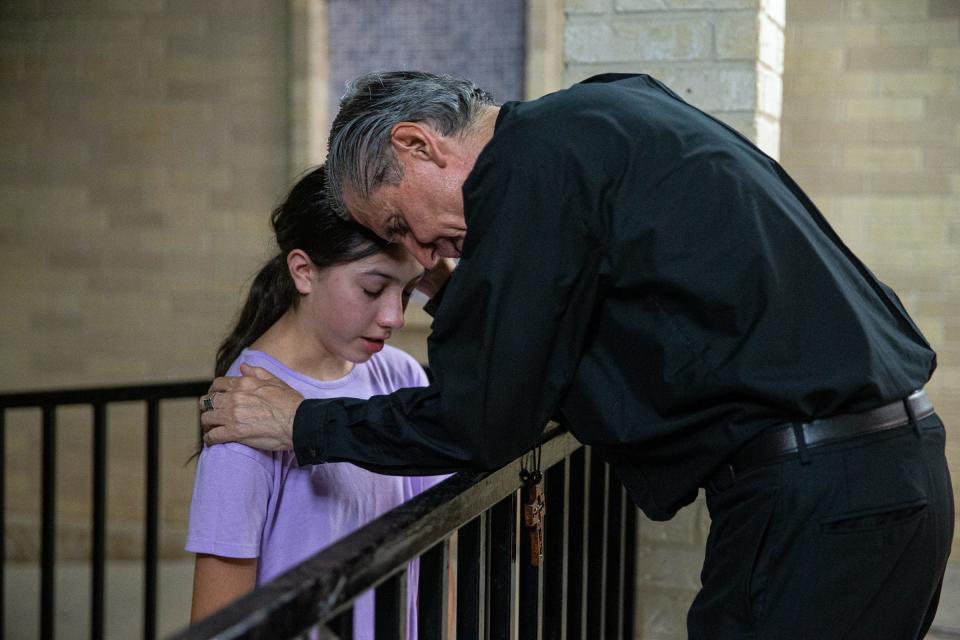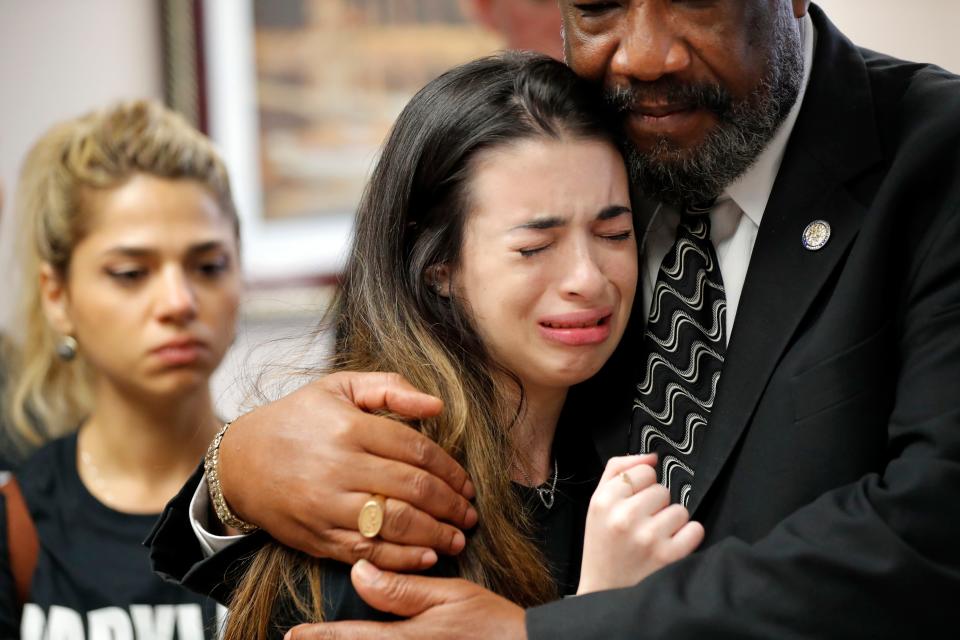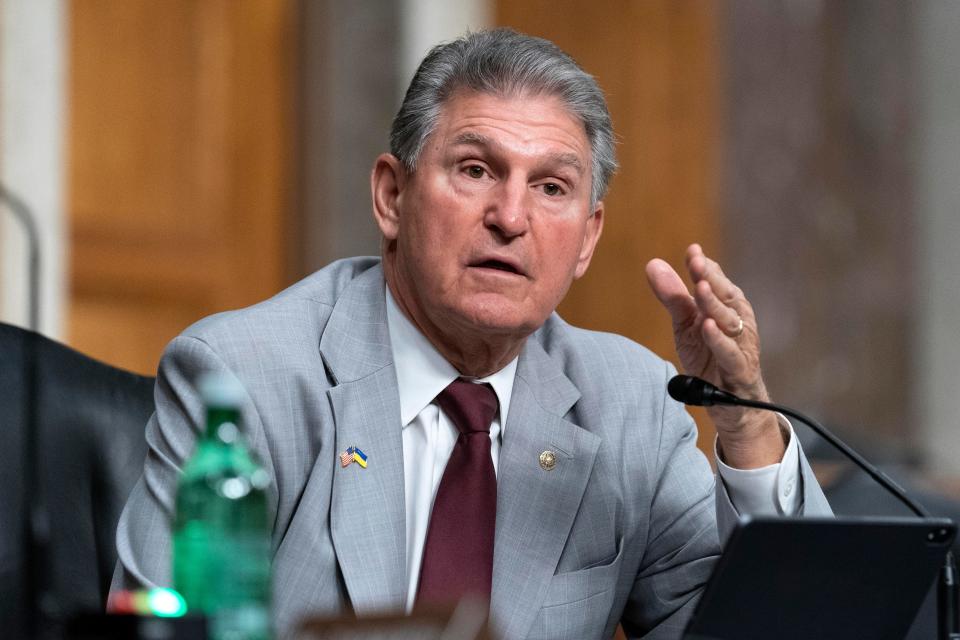'A bad day for ... hope': Another school shooting. More dead kids. Why gun control advocates see no end in sight
America has been here before: Sandy Hook. Charleston. Orlando. Parkland. El Paso. Buffalo. Many others.
Unspeakable carnage followed by spasms of charged rhetoric on Capitol Hill vowing change: weapons bans, background checks, red flags for mental health cases, ammunition magazine restrictions, gun sale loopholes.
Then ... nothing.
Echoing past tragedies, Americans condemn the killer of 19 elementary school children and two teachers and grieve with the families in Uvalde, Texas, but there's no sense of optimism that this is the mass slaying that will spur tough gun control laws.

"I'm done. They … failed our kids again, OK? I'm done. I've had it," a tearful Fred Guttenberg told MSNBC. His daughter Jaime was one of 14 students killed in 2018 at Marjory Stoneman Douglas High school in Parkland, Florida. Three staff members also died.
The fatalism is especially palpable among U.S. senators, where gun control advocates don't even pretend to have an answer.
"Not that I've heard. Not that I've seen in the conversations I've had with colleagues," Sen. Chris Coons, D-Del., said Wednesday about whether he thought Uvalde would push enough Republicans to the bargaining table.
Live updates: Texas school gunman warned of attack with online messages before rampage; Beto O'Rourke confronts Abbott
"They are disturbed, upset, troubled, but not willing to change where they are," he said. "This is a bad day. This is a bad day for anything even vaguely looking like hope or optimism around legislative process or progress."
Sen. Mark Kelly, D-Ariz., remembers how lawmakers vowed to enact gun restrictions after his wife, then-Congresswoman Gabby Giffords, survived a mass shooting in Tucson in 2011.
“It’s frustrating," he told USA TODAY. "I mean, could something possibly happen? I'm always hopeful that enough senators will come to their senses and do something on a problem that is uniquely American, and this problem doesn't exist in other countries.
But, "the past is prologue, right?” he said. “History repeats itself.”
A record of false hope
Mass shootings have prompted pledges of gun-related legislation, mostly from Democrats with a smattering of Republicans.
After the Sandy Hook Elementary shooting in 2012 in Newtown, Connecticut, where 26 people (including 20 children) died, President Barack Obama pushed legislation that would have expanded background checks for gun buyers and banned certain weapons and high-capacity gun magazines.
'What are we doing?' Sen. Chris Murphy gives emotional speech on Texas elementary school shooting
A few months later, the Senate defeated what was left of that effort: a measure by Sens. Joe Manchin, D-W.Va., and Pat Toomey, R-Pa., that would have expanded background checks to include purchases at gun shows and on the internet. It failed 54-46, six votes short of the 60 needed to bypass a filibuster. Forty-one Republicans were joined by five Democrats – primarily from states where gun ownership is high – to reject the proposal.
After a gunman killed nine parishioners in 2015 at Mother Emanuel Church in Charleston, South Carolina, Democratic lawmakers tried to close a gap in federal law that allows gun sales to proceed without a completed background check if three business days have passed.
The bill to close what became known as the "Charleston loophole" would have extended the background check review to 10 days. It passed the House but stalled in the Senate. President Joe Biden is pressing Congress to pass it with little success.
After the rampage in 2016 at the Pulse nightclub in Orlando, Florida, which left 49 dead and 53 injured, enthusiasm to tighten laws flickered briefly, but partisan disputes kept four gun-related bills from passage.
Democrats derided as a political stunt two GOP proposals that would have increased funding for the national background check system and created a judicial review process to keep a person on a terror watch list from buying a gun. Republicans dismissed as talking points two Democratic measures that would have expanded background checks to private gun sales and allowed the Justice Department to ban gun sales to suspected terrorists.

After the shooting on Valentine's Day 2018 at Marjory Stoneman Douglas High School , President Donald Trump expressed initial support to raise from 18 to 21 the minimum age to purchase a firearm and to expand background checks.
More: After another gun massacre of children, Mitch McConnell faces pressure to act in Senate
He later changed his mind, not that either proposal had much of a chance in the GOP-controlled Congress.
'The problem starts with people, not with guns'
Optimism for compromise on gun control is dimming for a simple reason: It takes 60 votes to pass legislation through the Senate, and Republicans, who occupy 50 seats, generally have different views on the solutions to mass shootings.
Many Republicans are heavily backed by gun rights groups: The top 20 recipients of gun lobby donations in the 2021-22 election cycle are all Republicans, according to data compiled by nonpartisan Open Secrets.
Republicans often blame poor parenting and social ills and support stationing more law enforcement at schools (Trump backed arming teachers after Parkland). They support some mental health screening for gun ownership but generally not to the degree Democrats want.

"The problem starts with people, not with guns," Sen. Tommy Tuberville, R-Ala., said Wednesday. "We've had guns forever. And we're gonna continue to have guns."
If at least 10 Republicans are going to budge, Missouri Sen. Roy Blunt would seem a logical candidate to be among them. One of the more centrist GOP senators, he will retire after this year, so a vote for gun control legislation is less risky to his political career than it might be to other Republicans.
He said Wednesday he's not aware of any "serious" discussion among Republicans to restrict gun access.
What you can do: Here's how you can help those affected by the Texas school shooting in Uvalde
Anger spills over: 'This is on you': Beto O'Rourke confronts Abbott, Cruz at Texas school shooting press conference
“People after the last couple of weeks have to be thinking, ‘Is there anything here that would make a difference if it happened at a national level?’
"I don't know the answer to that," he said. "New York has maybe the strongest red flag law, and it clearly didn't stop what happened in Buffalo. So I don't know that there's any one solution here."
Red flag laws generally permit police or family members to seek a court order to temporarily confiscate firearms from a person who may present a danger to others or themselves.
Republicans will be needed for any bill to pass. Manchin, who is working with Toomey on getting some gun control legislation enacted, reaffirmed Wednesday his opposition to eliminating the filibuster.
Though the West Virginia Democrat said there ought to be movement on background checks and red flags legislation, he said he opposes getting rid of the 60-vote threshold.

"We've been talking about throwing out the one tool (filibuster) that we have that keeps us working and at least talking together," he said. "Without that, we'd have nothing."
'This Congress is failing'
There are steps presidents can – and have – taken to limit gun access.
Last year, Biden directed his administration to tighten restrictions on so-called ghost guns, or untraceable weapons that can be constructed from parts purchased online.
Presidential orders are welcome, but they are no substitute for legislation that passes Congress, said Nicole Hockley, who co-founded the Sandy Hook Promise Foundation after her son, Dylan, was slain in the Newtown massacre.
More: My son never came home from Sandy Hook. My heart bleeds for Texas as I relive Dylan's murder.
"It can not (be) sustained if it's not also passed by Congress, the Senate and the House, and that's where we have problems right now and why nothing has really substantially and meaningfully happened at that level," she told MSNBC Wednesday. "There's not even a bill on the Senate floor right now for something as simple as background checks."
Sen. Elizabeth Warren, D-Mass., a fierce supporter of gun control, said it's no longer an issue of finding a bipartisan legislative solution. It's also about putting people on the record, so voters know where lawmakers stand after Uvalde.
“Put it on the floor and make a vote and then hold them accountable in November," she said Wednesday. "This is what Americans want us to do. We have a moral responsibility to do our best to keep our children safe, to keep our friends and neighbors safe. And this Congress is failing. ... Right now, the NRA is holding this Congress hostage.”
Democratic Sen. Tim Kaine, who as Virginia governor helped families cope with the massacre at Virginia Tech University that left 32 dead and 17 wounded in 2007, said he still suffers when he hears of another mass shooting.
"I've got PTSD. Anytime these things happen, it reminds me of Virginia Tech" he told USA TODAY Wednesday. "That kind of PTSD feeling is partly because of shooting and the number of deaths and especially deaths of kids, and it just brings back a lot of really painful memories. But it's made worse by (the fact) we haven't done anything."
This article originally appeared on USA TODAY: Uvalde mass shooting: gun control advocates pessimistic about change

